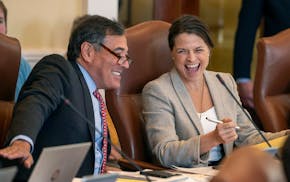They were bad at first glance.
But numerous absentee ballots got a new image Monday, when a Dakota County official testified that they were probably rejected by mistake.
In several instances, local elections officials neglected to send a voter-registration application to someone who needed one, he said. Other times, officials rejected ballots because voters didn't include a completed application -- although the voters were already registered and didn't need one.
"This appears to be a mistake," said Dakota County Elections Manager Kevin Boyle, when asked about one registered-but-rejected voter.
His testimony came as the trial over Norm Coleman's election lawsuit began its third week in the Minnesota Judicial Center in St. Paul. Republican Coleman is challenging recount results showing DFLer Al Franken with a 225-vote edge in the state's U.S. Senate race.
Coleman's lawyers called Boyle as a witness and elicited testimony trying to support their central argument that numerous absentee ballots were wrongly rejected and should now be counted. Ultimately, a three-judge panel hearing the case will decide whether rejected ballots are accepted.
Over several hours reviewing about 150 rejected ballots, Boyle acknowledged that about 30 of them were apparently discarded by local elections officials who misunderstood state law or mishandled ballot applications.
On some occasions they misinterpreted residency requirements. But in other instances, Boyle said, it's hard to tell why ballots were rejected because officials gave no written reasons on election documents.
One of the more nettlesome problems involved signatures on absentee-ballot return envelopes that election officials determined did not match those on the ballot applications. Exchanges between Coleman lawyer Joe Friedberg and Boyle demonstrated how hard it can be to tell whether a signature is genuine, an issue that could become critical during the trial.
"You can't say that it is the same person, but it would also be true you can't say it isn't," Friedberg asked, referring to signatures on documents for one ballot.
"That is correct," Boyle replied.
Regarding signatures involving another rejected ballot, Friedberg asked, "Don't they appear quite similar?"
"No, they do not," Boyle said.
"I guess that's what makes horse racing," Friedberg said.
Franken lawyers have contended that absentee ballot materials alone often don't explain why a ballot was rejected. Coleman attorneys have maintained that the materials often do provide the answer. Coleman lawyer Ben Ginsberg said the testimony provided further evidence that Coleman's chances to overturn Franken's lead remain alive.
Also Monday, the lawyers for both sides met with the judges during the lunch hour after District Judge Kurt Marben said they needed to discuss "a more expedient way" to handle evidence. Afterward, both sides declined to discuss the meeting.
The talks followed an objection by Franken lawyer David Lillehaug to the way Coleman's side is disclosing evidence in the trial. He said Coleman's lawyers had failed to disclose specific details to Franken's side about why ballots were wrongly rejected. Lillehaug said a lack of information could prolong the trial, inviting "a tedious page by page review of a thick stack of ballot envelopes," and asked the panel to restrain Coleman from introducing more exhibits without providing a better explanation for them. The panel denied the motion, and the Coleman legal team accused Lillehaug of "grandstanding."
kduchschere@startribune.com • 651-292-0164
pdoyle@startribune.com • 651-222-1210

Rep. Ilhan Omar's daughter suspended from college for involvement in pro-Palestinian protests

